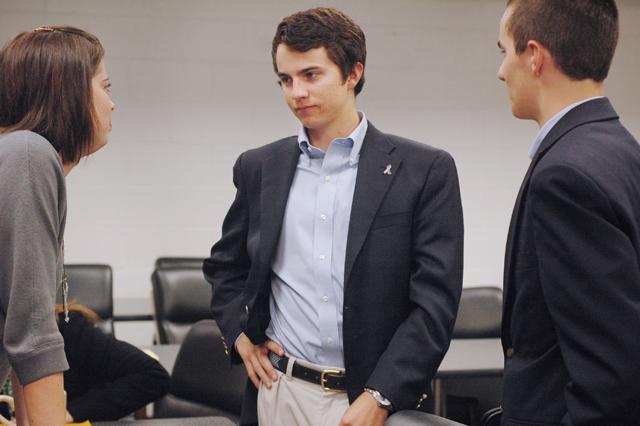The Student Senate passed pieces of legislation Wednesday that could impact student finances and advising.
During the shorter-than-usual meeting, an advising review bill was passed, as well as a piece of legislation encouraging the University to remove the distance education tuition penalty. The advising review bill passed with consent, while the distance education tuition penalty act required a roll call vote.
The advising review bill, from the committee on academics, encourages the Undergraduate Student Success Task Force to include advising reform in the “game changes” that are to be presented to the University Strategic Planning Committee.
Abbi Davis, a second-year Agricultural Institute student, said the committee on academics has heard positive feedback about the bill.
“This has been received favorably by students so far,” Davis said. “This is something that needs to be done.”
Justin Brooks, a junior in nuclear engineering, said he thinks this bill is important for Student Senate to pass.
“It’s like standing up to the University and saying something,” Brooks said. “I hope future students can have a better advising system in the years to come.”
The bill was sent to Student Body President Kelly Hook with consent from the Student Senate.
The second bill Student Senate passed during the meeting concerned the removal of the distance education tuition penalty. The bill was spearheaded by Taylor Hiott, academics commission director and a sophomore in political science.
According to Ethan Harrelson, a senior in biological sciences, distance education classes cost about $125 more per credit hour than on-campus classes. Matthew Tucker, a junior in environmental technology, questioned Harrelson on the likelihood of this bill making any difference in the future.
“It’s extremely likely that it will make a difference,” Harrelson said. “If we get on this soon enough, it could be in effect for either summer sessions or fall classes.”
Harrelson also said he wanted to point out the extra fees charged for distance education courses do not benefit the University in any way.
“The extra fees don’t stay with the University,” Harrelson said. “The extra money all stays downtown. Other universities have done similar things to this in regards to their distance education classes.”
Davis, whose committee reviewed this bill, said she knew of a lot of students who have had issues with distance education tuition.
“Taylor [Hiott] actually got the ball rolling with this,” Davis said. “DELTA [distance education and learning technology applications] does not receive compensation from this. The removal of the tuition penalty needs to be done anyway.”
Adam Hughes, a junior in communication, said he was in favor of the bill.
“I think this is a really good bill in the fact it gets rid of the fees,” Hughes said. “My only concern with this is the kids that are going to take advantage of it. I feel like students are going to be like, ‘I can go to class, or I can stay in my pajamas and watch this video at home.'”
Hughes said he feels like students will take advantage of the lack of a tuition penalty.
“Any step away from traditional learning doesn’t sit well with me,” Hughes said. “Maybe we should make it so that students have to have a good reason to take a distance education class.”
Stephen Chavez, a doctoral student in animal science and poultry science and newly appointed graduate senator, shared his opinions of the bill as a doctoral student.
“In CALS, a professor, Dr. Allen, is trying to put all his classes online, just because he doesn’t really like teaching,”Chavez said. “He’s pretty much forcing students to take his class online. There’s only one section that has 10 students in class, and 50 students distance education. I had to be physically put into the class portion, just so I don’t have to pay the distance education fees.”
The distance education tuition penalty act passed with 35 of the 36 senators present voting for the bill. The only senator voting against the bill was Johnathan Tucker, a sophomore in political science.








